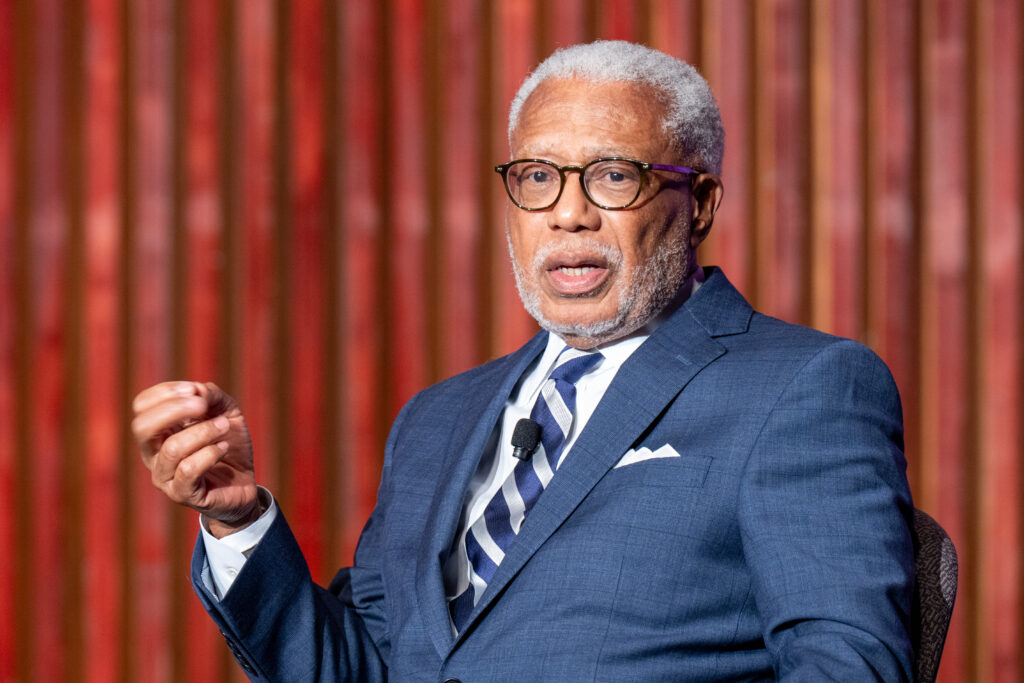Manekin-Clark Annual Lecture

Inspiring the public to champion religious pluralism
The annual ICJS Manekin-Clark Lecture presents leading thinkers, scholars, and practitioners to help the public better understand religious diversity, and champion its importance to our shared public life.
The lecture is named in honor of two long-time Baltimore civic leaders, Bernard Manekin and A. James Clark, in recognition of their interreligious friendship. The lecture is made possible by endowment funds from the A. James and Alice B. Clark Foundation and the Manekin family.
All lectures are free and open to the public.
The Manekin-Clark Lecture is an expression of the beliefs of Bernie Manekin and Jim Clark that we belong to one another despite our differences, that people of all faiths (or no faith) can challenge one another to live in ways that deepen our respective commitments, strengthen our communities, and respect the dignity of every person.
ICJS executive director and Roman Catholic scholar
Manekin-Clark Archives
Wake Up Running: A vision for connection and transformation
In his address, Dr. Walter Fluker shared his insights into the life and teaching of Howard Thurman, the challenges facing our democracy, and the call to congregate, conjure and conspire at the crossings.
American Muslims at a Crossroads
Dalia Mogahed presented results from the American Muslim Poll, which places the opinions and demographics of American Muslims in the context of other religious communities. October 2022
Recapturing the Prophetic Tradition
Dr. Susannah Heschel offered a friendly critique and challenge of interreligious dialogue, drawing on the legacy of her father, Rabbi Abraham Joshua Heschel, whose work and writings on the prophetic tradition offer a model to irspire and sharpen future dialogue. December 2021
Religion & Politics in Transition:
The End of White Christian America
Robert P. Jones, Ph.D. Founder and CEO, Public Religion Research Institute, December 2019
White Supremacy, Power, and the Role of Interfaith
Beverly Mitchell, Ph.D., Professor of Historic Theology, Wesley Theological Seminary, June 2018
Banning Sharia
Anver Emon, Ph.D., Professor of Law and History; Canada Research Chair in Islamic Law and History; Director, Institute of Islamic Studies at University of Toronto, April 2017
Imagining Justice in Baltimore: A Jewish Perspective
Marc Gopin, Ph.D., Director, Center for World Religions, Diplomacy and Conflict Resolution, George Mason University, April 2016
Interfaith Leadership: Building a Healthy Democracy
Eboo Patel, Ph.D., Founder and President Interfaith Youth Core (IFYC), May 2015
Video contains only the Q&A Session
Collision: Jews, Christians, and Muslims
David Nirenberg, Ph.D., Deborah R. and Edgar D. Jannotta Professor of Medieval History and Social Thought, University of Chicago, May 2014
From Religious Intolerance to Creative Engagement
Rabbi David Rosen, International Director of Interreligious Affairs, American Jewish Committee, June 2013
Video Not Available
Robert Eisen, Ph.D.
April 2012
Video Not Available